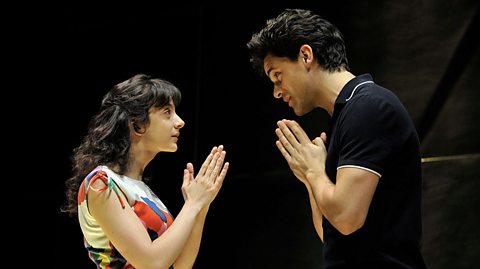What is The Merchant of Venice about?
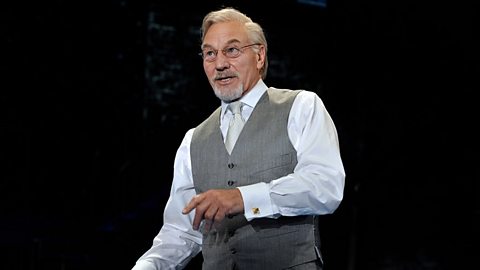
The Merchant of Venice is a play by William Shakespeare set in Italy in the 16th century. It is classified as a comedy, although it also has elements of tragedy.
The play is made up of five acts вҖ“ a traditional structure for ShakespeareвҖҷs plays.
The play follows two separate narratives:
- a bloodthirstyCruel and barbaric. bargain made between shipping merchant Antonio and moneylender Shylock
- a romance between AntonioвҖҷs friend Bassanio and beautiful, intelligent heiress Portia.

Plot overview
This timeline shows 10 key moments from ShakespeareвҖҷs play The Merchant of Venice.
Activity
Context: Antisemitism

The Merchant of Venice is considered controversial because of its portrayal of antisemitism.
Antisemitism is a type of prejudice or discrimination towards Jews individually or as a group. It is based on unfounded stereotypes that target Jews as a people or their religious practices and beliefs.
The impact of antisemitism has resulted in Jewish people facing discrimination, being banishedTo send someone away from a country or place as a form of punishment. or even murdered.
Antisemitism was common in in Europe when Shakespeare wrote The Merchant of Venice. In Venice itself, Jewish people had been forced to live in a separate area of the city since 1516.
Today there are various interpretations of the antisemitism in The Merchant of Venice. People cannot agree on whether the play is antisemitic or seeks to criticise antisemitic behaviour. This is one of the reasons it is sometimes described as a вҖңproblem playвҖқ.
Act 1
Antonio is feeling sad, Bassanio has money worries
Act 1 begins in Venice, where Antonio, a shipping merchant, is feeling depressed. He explains to his friends Solario and Solanio that he feels sad for no reason. They wonder if he is worried about his ships at sea, then poke fun at him - suggesting he is secretly in love with a mystery woman, which is making him moody.
Antonio is joined by more friends вҖ“ the witty Gratiano who вҖңspeaks a great deal of nothingвҖқ and enjoys rude jokes, a young man called Lorenzo, and AntonioвҖҷs best friend Bassanio.
When left alone with Antonio, Bassanio talks about a lady called Portia. She lives in a grand estate called Belmont and her father has recently died. Bassanio hopes to be her husband, but he has been wasting his money and doesnвҖҷt have enough to take the trip to see her.
Antonio explains that all his money is tied up in his ships at sea, but he will try to use his influence to borrow money on BassanioвҖҷs behalf.
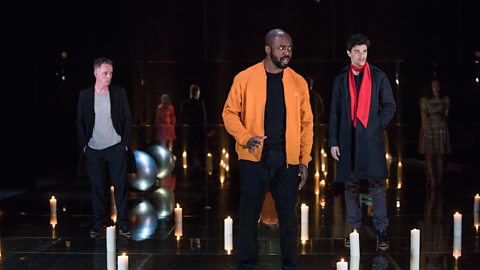

МэМэМэМэМэМэ
Did you know?
In some productions, it is suggested that Antonio has romantic feelings towards Bassanio.
Although there is no definite evidence of this in the text itself, some directors choose to explore the close friendship between the two men, and the power that Bassanio seems to have over Antonio.
Question
Why is Antonio so sad at the start of the play?
Answer
At the start of the play, Antonio cannot explain why he feels so sad, he says, вҖңIn sooth, I know not why I am so sadвҖқ. His friends tease him that he is in love with a mystery woman, or suggest that he is worried about his ships, but he denies this.
Portia cannot choose her own husband
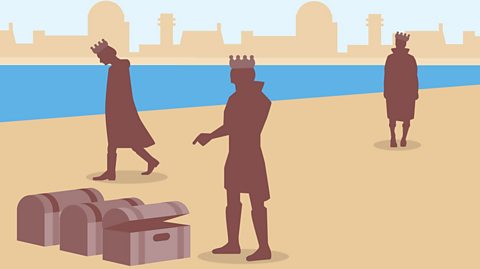
Portia and her waiting womanA woman of high social status who acted as a personal assistant to an aristocratic woman such as a queen. Nerissa are in Belmont. Portia is annoyed that she cannot choose her own husband. Instead, her father has left instructions that she must marry whoever solves a series of riddles inscribed on three caskets of gold, silver and lead.
The two women discuss the potential husbands who have visited Portia so far вҖ“ none of whom have solved the riddles.
They then talk about a young man Portia has previously met, called Bassanio, and remember him fondly, before more suitors appear.

Context: Patriarchy

Patriarchy is a system or society where men hold the power and women are excluded from powerful positions.
In The Merchant of Venice, Portia is subject to the patriarchal influence of her father after his death вҖ“ she canвҖҷt choose her own husband but is reliant on her dead father to choose based on the riddles that he has created. This must be very humiliating for an intelligent character like Portia.
In ShakespeareвҖҷs time, women were expected to be obedient to men. They were not allowed to act on stage, to go to school, to work as doctors or lawyers, or to work in skilled trades. They were not allowed to buy land or property.
Antonio makes a bargain
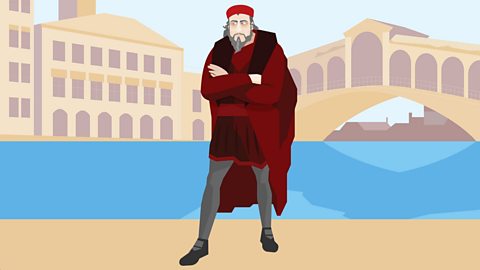
Antonio and Bassanio visit the Jewish moneylender, Shylock, to see if he will lend money to Antonio. Antonio will be responsible for repaying it, but he will give the money to Bassanio for his trip to visit Portia.
Antonio teases Shylock by saying that it will be more enjoyable for Shylock to punish an enemy who doesnвҖҷt pay the money back on time.
Shylock agrees to lend the money, but only if the penalty for breaking the contract is that Shylock can cut a pound of flesh from whichever part of AntonioвҖҷs body he chooses.
Antonio is confident in the wealth he has at sea so agrees to this deal. Bassanio is worried and horrified.

Question
How does this scene show Antonio's antisemitismAntisemitism is a type of prejudice or discrimination towards Jews individually or as a group. It is based on unfounded stereotypes that target Jews as a people or their religious practices and beliefs. towards Shylock?
Antonio and Bassanio's antisemitism is clear in this scene.
Antonio calls Shylock a number of cruel names including a "devil", an "evil soul" and a "villain". He likens him to a "rotten apple".
Shylock remembers a time in the street when Antonio spat on him and called him a вҖңJewish dogвҖқ.
Because AntonioвҖҷs hatred of Shylock is rooted in AntonioвҖҷs dislike for his Jewish faith and traditions, this type of racist prejudice is called antisemitism.
Act 2
Trouble for Shylock
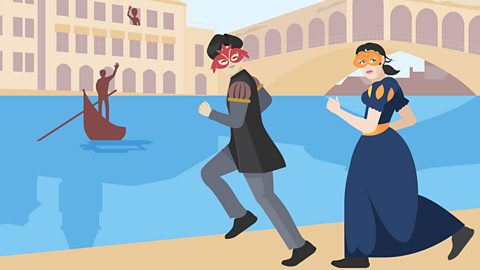
Shylock encounters all sorts of trouble in Act 2. A key member of his staff leaves him, he is tricked by Bassanio and his friends, and his daughter runs off with a Christian man.
- Firstly, ShylockвҖҷs servant Launcelot uses a monologueA speech given by a single character, often alone on the stage. The character speaks to the audience, usually giving his or her private thoughts aloud. to debate with his conscience whether he should leave Shylock. He refers to Shylock as a вҖңdevil incarnationвҖқ вҖ“ again showing the antisemitismAntisemitism is a type of prejudice or discrimination towards Jews individually or as a group. It is based on unfounded stereotypes that target Jews as a people or their religious practices and beliefs. of the Christian characters in the play. He eventually decides to leave Shylock and work for Bassanio.
- ShylockвҖҷs daughter Jessica is sad to see Launcelot go and asks him to do her a final favour вҖ“ give a letter to Lorenzo. She hopes to вҖңbecome a ChristianвҖқ and a вҖңloving wifeвҖқ to Lorenzo by running away from her father, who she admits she is ashamed to be related to.
- Lorenzo plots with Gratiano and his other friends how he will meet Jessica at night and run away with her, using a masqueA form of entertainment, which consisted of dancing and acting performed by masked players. Venice was famous for its masqued carnivals. party arranged by Bassanio as cover. Shylock is going to the party, and while he is gone Jessica plans to disguise herself as young man and escape with Lorenzo, taking some of her fatherвҖҷs money with them.
- Heading to the party, Shylock tells Jessica to stay away from вҖңChristian foolsвҖқ. But he is too late. Lorenzo arrives at the house shortly after ShylockвҖҷs departure with friends Gratiano, Solario and Solanio. Jessica escapes with Lorenzo just as the weather conditions change and the party is cancelled.
In a separate plotline, Bassanio is seen preparing to make the visit to Portia with his friend Gratiano.


В В В В В В В
Did you know?
Shakespeare uses a technique called foreshadowingA technique used when writers give hints of future events. The reader may only realise that foreshadowing has been used after the future event happens. when he introduces the bad weather.
The bad weather hints at trouble for AntonioвҖҷs ships and difficulty repaying the loan.
Mini quiz
Act 3
Shylock challenges prejudice
Solario and Solanio are worrying about AntonioвҖҷs ships amid rumours they have sunk in bad weather. When Shylock enters, they cruelly laugh at him about his missing daughter.
Shylock has heard the rumour about AntonioвҖҷs ships and reacts by saying that Antonio should вҖңlook to his bondвҖқ. Shylock says he looks forward to getting AntonioвҖҷs pound of flesh as revenge for AntonioвҖҷs cruel mistreatment over the years.
Shylock gives a powerful speech about the mistreatment of Jewish people, in which he asks why they should be treated differently from others. вҖңHath not a Jew eyes?вҖқ he asks, вҖңIf you prick us, do we not bleed?вҖқ.
When Solario and Solanio leave, Shylock is joined by his Jewish friend Tubal, who gives more detail about JessicaвҖҷs disappearance, and the valuables she has taken with her. Shylock shows a more emotional side of himself as he mourns the loss of a ring taken by Jessica вҖ“ it was a gift from his late wife.

Question
Read ShylockвҖҷs powerful speech.
What language technique does Shakespeare use in every sentence?
вҖңHath not a Jew eyes? Hath not a Jew hands, organs, dimensions, senses, affections, passions; fed with the same food, hurt with the same weapons, subject to the same diseases, healed by the same means warmed and cooled by the same winter and summer as a Christian is? If you prick us do we not bleed? If you tickle us do we not laugh? If you poison us do we not die? And if you wrong us shall we not revenge?вҖқ
The speech is made up of rhetorical questiona question asked to make a point, rather than get an answer.. These encourage the audience identify with Shylock and feel sympathy for him.
The speech demonstrates ShylockвҖҷs humanity and challenges the cruelty of the abuse he has received from Antonio and some of the other Christian characters in the play.
Romance in Belmont, trouble in Venice
In Belmont, Bassanio solves the riddles and chooses the lead casket. He realises that вҖңthe outward shows be least themselves/the world is still deceived by ornamentвҖқ. In other words, the gold and silver look more valuable, but the greatest prize is hidden in the least valuable-looking case.
Bassanio and Portia are engaged, and by coincidence Gratiano has fallen in love with PortiaвҖҷs waiting woman Nerissa and asks if they can be married too. Bassanio and Portia exchange rings and Bassanio promises he will never part with PortiaвҖҷs ring.
The celebration is interrupted by the arrival of Lorenzo and Jessica, with Solario. Solario bears a letter which confirms that all of AntonioвҖҷs ships have apparently sunk.
Worried about Antonio, Portia suggests that Shylock be offered twice the sum borrowed вҖ“ 6,000 ducatA currency that originated in Venice and was used across Europe in the medieval era. вҖ“ rather than take AntonioвҖҷs flesh. Bassanio leaves to go to support Antonio in Venice. Portia secretly reveals to Nerissa that she has a plan of her own.
Meanwhile, in Venice, Antonio is arrested for failure to repay the debt to Shylock. Despite pleading with him, Shylock insists that he will have his bond вҖ“ the pound of flesh. Antonio accepts his fate.

Question
There are various examples of foreshadowing in The Merchant of Venice. One example is the bad weather at the end of Act Two which foreshadows difficult times ahead for the characters.
In this scene, Bassanio promises that he will never part with PortiaвҖҷs ring.
How might this foreshadow later events in the play?
This foreshadows the scene where Bassanio is tricked into giving away his wedding ring towards the end of the play.
Shakespeare deliberately has Bassanio make a promise which he knows he will make Bassanio break later on.
Act 4
The trial of Antonio
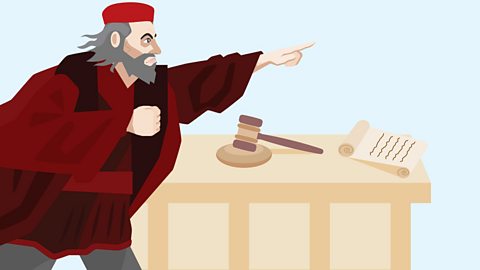
The trial is fast-moving with many twists and turns. It is difficult for the audience to know who to support. Shylock is cruel and determined in his desire to take a piece of AntonioвҖҷs flesh, whilst the judge and Christian characters displayantisemitismAntisemitism is a type of prejudice or discrimination towards Jews individually or as a group. It is based on unfounded stereotypes that target Jews as a people or their religious practices and beliefs. once again.
- The Duke of Venice is the judge and begins the trial. He calls Shylock вҖңa stony adversary, an inhuman wretchвҖқ and вҖңthe JewвҖқ.
- Shylock arrives in court and asks for the pound of flesh.
- Bassanio offers double the borrowed amount. Shylock rejects this offer
- It is announced to the court that a Doctor of Law from Padua has arrived with his clerk.
- Portia arrives, disguised as the Paduan lawyer Balthasar, with her clerk (Nerissa вҖ“ also disguised). Portia asks Shylock to consider accepting a greater sum of money in place of the flesh.
- Shylock refuses and Antonio prepares himself for death.
- Bassanio tells Antonio that his love for him is so great that he would give up вҖңhis wife and all the worldвҖқ to save Antonio.
- In the nick of time, Portia jumps in and points out that the bond contains no mention of blood. Shylock can only take the flesh if he can do so without spilling a drop of blood.
- Shylock realises he is defeated and the Duke orders Shylock to convert to Christianity and give half his wealth to Lorenzo.
- Devastated, Shylock leaves the court, agreeing to all terms.

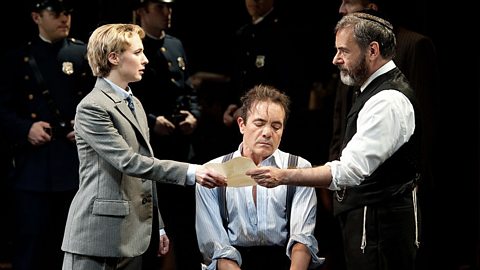
After all the courtroom drama, there is a comical interlude.
- Bassanio thanks Balthasar, not realising that it is Portia in disguise.
- Balthasar (Portia) sees the wedding ring on BassanioвҖҷs finger and asks for it in payment for вҖңhisвҖқ services in court.
- Bassanio reluctantly hands over the ring. Similarly, Gratiano gives his ring to BalthasarвҖҷs clerk (Nerissa).
Question
How does Portia win the case for Antonio and ensure the defeat of Shylock?
She shows the court that the contract does not allow Shylock to take any blood while removing AntonioвҖҷs flesh
Act 5
A comical ending
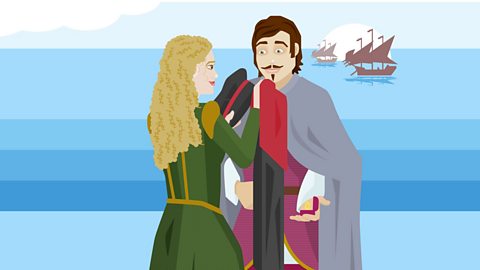
In Belmont, Jessica and Lorenzo are declaring their love for each other and comparing themselves to famous lovers from history when they receive a message that Portia is returning.
Portia and Nerissa arrive home, closely followed by Bassanio and Gratiano with the recently saved Antonio. Antonio is introduced to Portia and the men explain what happened at court, including the news of the mysterious lawyer and his clerk.
Portia and Nerissa trick their husbands into revealing that they have given away their wedding rings. Portia says that she will not be BassanioвҖҷs wife until he can produce the ring. After some time teasing the men, Portia and Nerissa give them back their rings and reveal that they were the lawyer and clerk.
In a surprise final twist, messengers reveal that AntonioвҖҷs ships are not all destroyed after all, just as Lorenzo discovers that he has inherited ShylockвҖҷs money.


Comedy or Tragedy?
ShakespeareвҖҷs comedies usually centre around love and relationships. They usually begin with a problem (such as PortiaвҖҷs casket riddle and BassanioвҖҷs money worries) and end with a happy resolution. They often involve disguise and confusion.
ShakespeareвҖҷs tragedies usually centre around the ruin or destruction of a character. The character usually begins the play in a strong position, but events occur throughout the play which lead to his or her downfall.
The Merchant of Venice was first classified as a comedy but has tragic elements too.
Quiz
Test your knowledge of the plot of ShakespeareвҖҷs Merchant of Venice by taking this multiple-choice quiz.
Quiz
Test your knowledge of the plot of ShakespeareвҖҷs Merchant of Venice by taking this multiple-choice quiz.
More on The Merchant of Venice
Find out more by working through a topic
- count3 of 5
